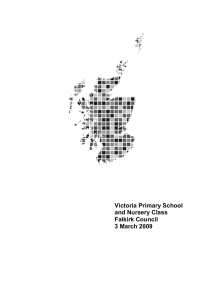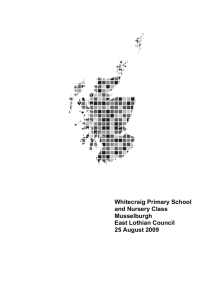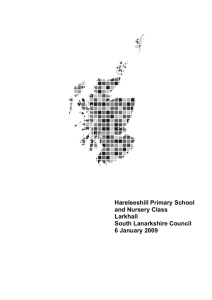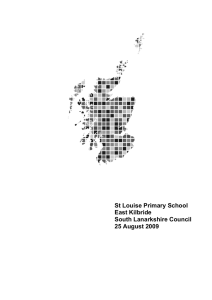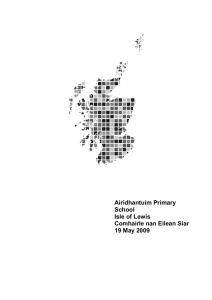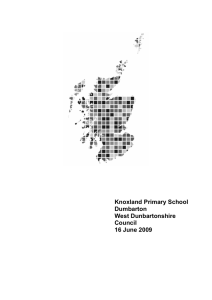Quarter Primary School and Nursery Class South Lanarkshire Council
advertisement
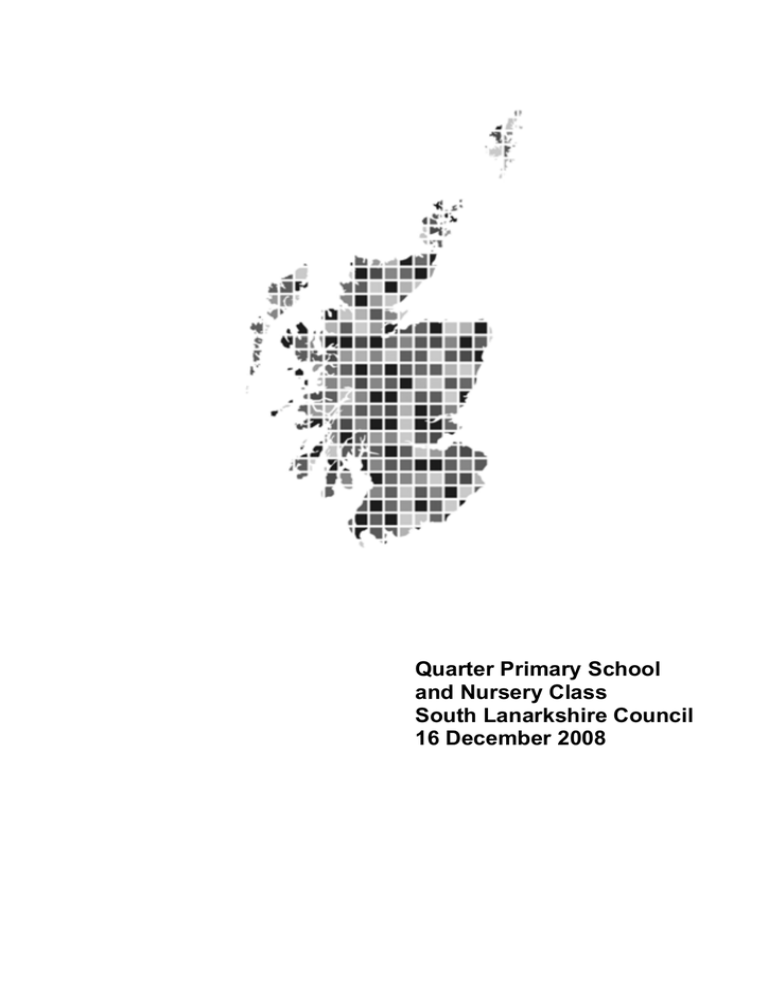
Quarter Primary School and Nursery Class South Lanarkshire Council 16 December 2008 This report tells you about the quality of education at the school1. We describe how children benefit from learning there. We explain how well they are doing and how good the school is at helping them to learn. Then we look at the ways in which the school does this. We describe how well the school works with other groups in the community, including parents2 and services which support children. We also comment on how well staff and children work together and how they go about improving the school. Our report describes the ‘ethos’ of the school. By ‘ethos’ we mean the relationships in the school, how well children are cared for and treated and how much is expected of them in all aspects of school life. Finally, we comment on the school’s aims. In particular, we focus on how well the aims help staff to deliver high quality learning, and the impact of leadership on the school’s success in achieving these aims. If you would like to learn more about our inspection of the school, please visit www.hmie.gov.uk. Here you can find analyses of questionnaire returns. Where applicable, you will also be able to find descriptions of good practice in the school. 1 2 The term ‘school’ is used to include the work of the nursery class, where relevant. Throughout this report, the term ‘parents’ should be taken to include foster carers, residential care staff and carers who are relatives or friends. Contents 1. The school 2. Particular strengths of the school 3. Examples of good practice 4. How well do children learn and achieve? 5. How well do staff work with others to support children’s learning? 6. Are staff and children actively involved in improving their school community? 7. Does the school have high expectations of all children? 8. Does the school have a clear sense of direction? 9. What happens next? 1. The school Quarter Primary School and Nursery Class is a non-denominational school with a nursery class. It serves the village of Quarter and surrounding areas. The inspection was carried out in October 2008 at which time the roll was 101, including 12 in the nursery. Pupils’ attendance was well above the national average in 2006/07. 1 2. Particular strengths of the school • The headteacher’s success in establishing a clear vision for the school and nursery class and sharing this with the community. • Courteous, well-behaved and responsible children. • Opportunities for children to achieve during school and out-of-school hours. • Approaches to developing children’s citizenship skills. • Strong partnerships with the community to support children’s learning. 3. Examples of good practice • Approaches to enterprise which motivate children. • Productive links with departments in the associated secondary school which improve children’s confidence in learning. 4. How well do children learn and achieve? Learning and achievement Children in the nursery class are achieving well in their development and learning. They are learning to speak confidently to one another in a larger group where they can share their experiences. Children listen very well to favourite stories and are learning that the words and 2 pictures tell the story. All of the children can read their own name and a few are beginning to write it. Children are good at counting when playing games. They know how to care for birds as the seasons change and can describe how to plant bulbs for the spring. They are becoming confident when using the computer. Across the primary stages, there has been a steady improvement of standards in reading. Over the last few years, the school has maintained a very good level of performance overall in writing and mathematics. Children did not always make sufficient progress from early achievement in mathematics as they moved through the school. Children at the early stages were mostly confident when talking about their work and their interests. By P7 children were able to discuss favourite books and authors and give their views on different types of writing. They make good use of their skills in reading for information to carry out research for the topics they study. Children involved in groups such as the eco committee showed good discussion skills and listened well to each other. In mathematics, almost all children were accurate in number, money and measure activities. Children in P7 could analyse and discuss different types of graphs and could use spreadsheets to create them. Across the school, children could describe and use suitable strategies to solve mathematical problems. They achieve success across a very wide range of cultural and sporting activities during and after the school day. Children have developed confidence through taking part in regular school trips and meeting a wide variety of visitors to the school. They are developing a very good understanding of how to live healthily. Their personal, social and citizenship skills are developing very well. Curriculum and meeting learning needs In the nursery class, staff provide experiences which help children progress across all key aspects of learning and development. They carefully observe children at play and plan activities which interest them. They have yet to use this information fully to provide appropriate challenge to enable children to progress at their own rate. In the primary classes children experience a very broad curriculum 3 with a number of innovative approaches. These include, for example, planned links between literacy and enterprise and with secondary subject specialists. These are in line with the national initiative, Curriculum for Excellence. Teachers increasingly plan tasks and activities which develop children’s literacy and numeracy skills across the curriculum. Visiting specialists help to develop children’s skills, for example, in music and physical education. Children would benefit from more time being allocated to physical education. Enterprise activities are well planned and children find them stimulating. Children need to be given more opportunities to use information and communications technology (ICT) as part of their learning in all aspects of the curriculum. Children’s learning needs are well met. They are happy in the nursery and are becoming independent learners. Children are learning to suggest their own ideas for activities and work together. Older nursery children would benefit from more support to plan their own activities. In the primary classes, there are good arrangements to meet the needs of all children. Staff are good at identifying the learning needs of children. Most teachers share with the class what they expect them to learn and check for understanding. They now need to provide more opportunities for children to apply their learning in practical ways and have a clearer grasp of what they need to do to improve their learning. Children complete homework well which is linked to their class work. Higher-achieving children need to be given more challenging tasks. Children are supported very well to make a confident and successful move from nursery to P1 and from P7 to Hamilton Grammar School. 5. How well do staff work with others to support children’s learning? Staff in the nursery and primary stages have developed effective partnerships with a range of support services and other organisations. The school works closely with the supportive Parent Council. It has strong links with the nearby Duchess Nina Nursing Home where the school garden is located. Various local businesses have helped fund 4 school improvements including outdoor learning. Staff across the school work effectively with partner agencies to identify and help those children who require additional support. Parents whose children have additional support needs are involved in reviewing progress and in planning next steps in their learning. A number of staff and visiting professionals such as a speech and language therapist and a hearing impairment teacher, work closely with children to help them make progress in their learning. Primary staff and secondary subject specialists worked together with P7 children on various topics. At the end of the experience the children developed confidence by delivering a presentation to over 200 parents at the P7 parents’ induction evening. 6. Are staff and children actively involved in improving their school community? Children respond well to opportunities to take on responsibilities within the school. For example, children from P2 to P7 take an active part in the pupil council. This helps to take forward new developments in the school. Children in P7 show very good skills in taking responsibility as monitors to help younger children. They enthusiastically carry out roles such as house captain and playgroup leaders. Children at all stages are happy with how the school responds to their concerns. They would like more say in how learning could be made better. Children care for their environment and have learned how to recycle materials and save energy. The school has gained three Eco-School Scotland green flags and has achieved a Health Promoting Schools Gold Award. Staff have worked very well together to improve the school and have enthusiastically taken on leadership responsibilities such as enterprise, ICT, health promotion and eco work. 7. Does the school have high expectations of all children? Children work well together in school and show concern for each other. They behave very well and show respect for others. Children 5 reported that they were treated fairly and that they felt safe in the school. Relationships between staff and children are good. Staff use praise well to motivate children in their learning. They understand the school’s child protection arrangements. The school has introduced a caring and sharing corridor to tell children what to do and who to talk to if they have concerns. Children find this helpful and reassuring. Children’s wider achievements are recognised and celebrated through displays, assemblies, newsletters and in a local magazine. Staff have high expectations of the standard of written work in jotters. They do not always have high enough expectations of what children can achieve in their classwork. 8. Does the school have a clear sense of direction? The school has recently developed a new vision statement related to Curriculum for Excellence. This was agreed by staff, parents and shared with the community. The headteacher, working with staff, parents, children and partnership agencies has clearly identified areas in which the school has helped to improve children’s learning and areas for development. She has provided a strong lead in curriculum development. A wide variety of methods for monitoring and evaluating the work of the school are in place which involves all staff. The headteacher has given staff helpful feedback on their teaching. She now needs to further apply her monitoring and evaluation arrangements to improve the learning experiences of all children. The school is well placed to continue to improve. 9. What happens next? We are confident that the school will be able to make the necessary improvements in light of the inspection findings. As a result, we will make no more visits following this inspection. The school and the education authority will inform parents about the school’s progress in improving the quality of education. 6 We have agreed the following areas for improvement with the school and education authority. • Ensure that tasks and activities meet children’s learning needs. • Improve the pace of learning for children, particularly those capable of achieving high standards. • Continue to develop approaches to self-evaluation to help improve the quality of children’s learning. At the last Care Commission inspection of the nursery class there were no requirements. Four recommendations were made, four had been addressed 7 Quality indicators help schools and nursery classes, education authorities and inspectors to judge what is good and what needs to be improved in the work of a school and a nursery class. You can find these quality indicators in the HMIE publications How good is our school? and The Child at the Centre. Following the inspection of each school, the Scottish Government gathers evaluations of three important quality indicators to keep track of how well all Scottish schools and nursery classes are doing. Here are the evaluations for Quarter Primary School and Nursery Class. Primary school. Improvements in performance Learners’ experiences Meeting learning needs very good good good Nursery class Improvements in performance Children’s experiences Meeting learning needs good good good We also evaluated the following aspects of the work of the school and nursery class. The curriculum Improvement through self-evaluation HM Inspector: Marie McAdam 16 December 2008 8 very good good To find out more about inspections or get an electronic copy of this report go to www.hmie.gov.uk. Please contact the Business Management and Communications Team (BMCT) if you wish to enquire about our arrangements for translated or other appropriate versions. If you wish to comment about any of our inspections, contact us at HMIEenquiries@hmie.gsi.gov.uk or alternatively you should write in the first instance to BMCT, HM Inspectorate of Education, Denholm House, Almondvale Business Park, Almondvale Way, Livingston EH54 6GA. Our complaints procedure is available from our website www.hmie.gov.uk or alternatively you can write to our Complaints Manager, at the address above or by telephoning 01506 600259. If you are not satisfied with the action we have taken at the end of our complaints procedure, you can raise your complaint with the Scottish Public Services Ombudsman (SPSO). The SPSO is fully independent and has powers to investigate complaints about Government departments and agencies. You should write to SPSO, Freepost EH641, Edinburgh EH3 0BR. You can also telephone 0800 377 7330, fax 0800 377 7331 or e-mail: ask@spso.org.uk. More information about the Ombudsman’s office can be obtained from the website at www.spso.org.uk. This report uses the following word scale to make clear judgements made by inspectors. excellent very good good satisfactory weak unsatisfactory outstanding, sector leading major strengths important strengths with some areas for improvement strengths just outweigh weaknesses important weaknesses major weaknesses Crown Copyright 2008 HM Inspectorate of Education

